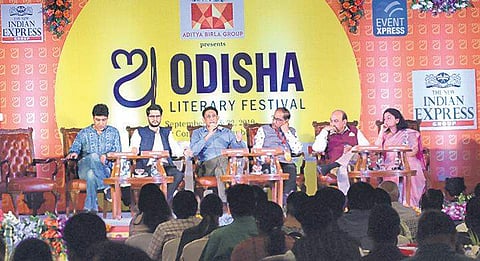

October to February, the long transit period from one year to the other, is the time for literature festivals (litfests) in India. They are increasing by droves and each city wants to have one of its own; it’s almost a symbol of having arrived at the altar of being counted among evolved communities. No problem with that. In fact, it is a time and effort well spent by different segments of society. It’s a good exposure to children who are in the process of picking up a reading habit.
Many of these events have special sessions for children, story reading and enactment included. Almost the finest thing about many of these ‘litfests’ is that they are not hogged by a single language. At the recent Mangalore Litfest, Kannada literature deservingly received as much attention as that of English. However, what is increasingly becoming a very enjoyable content at most litfests is the inclusion of strategic discussions, connected to a book or perhaps sometimes without any connect except the currency of the issue; the best example being Kashmir.
I call this the beginning of the rise of strategic culture in India. There is tremendous inclination towards understanding national and international security affairs but there remains a dearth of sufficient basic literature. So when strategic analysts discuss a book or just a current subject of security value, people strain to listen to every word in the hope of a better understanding. Many of them are civil services aspirants or looking for a shy at the defence services and have queries about doing well in the Services Selection Board interviews.
Some fine cities such as Bhubaneswar and Bhopal are receiving renewed attention. The recent Mangalore litfest proved how well volunteers with some leadership and corporate sponsorship can put together a well-managed event standards of which can progressively improve with time. At Mangalore, I had a fine panel for discussion on that mother of all subjects today, Kashmir.
Since most festival organisers are from the younger generation, the presence on social media is heartening with facility to view through live streaming or later watch YouTube recordings. Unfortunately, time is always at premium and disallows a full and meaningful discussion with sufficient questions from the audience but it is good enough for touching on essentials.
At Mangalore, it was good to hear Arif Mohammad Khan; the Governor of Kerala held forth on a serious subject such as Islam in India which he put across with a very rational perspective; some political speakers do participate in litfests but it would also be good to have them speak on subjects other than their immediate domain.
In some cases state governments are deeply involved in organisation and even sponsorship. It’s a good investment which may not have immediate tangible returns but in the long run there is much to be gained. Efforts to cut down on ideological baggage seem to be dominating with no particular orientation towards inclusion and exclusion of speakers with different opinion, a hallmark of an educated society.
Dehradun’s Valley of Words (VOW) is a charming fest in a very idyllic setting. Its dedication of a section to military literature is a forte. It is in sync with the other ongoing lonely effort by Shiv Kunal Varma, the excellent military historian, to cultivate interest in military history in various schools. Dehradun by virtue of its outstanding education institutions is the ideal town for this effort. Focus on post-independence military-strategic issues revolving around different situations in battlefields of 1965 and 1971 wars, is to be appreciated.
Mussoorie has a limited festival too, conducted by the Lal Bahadur Shastri National Academy of Administration. In fact, all hill stations need to have a festival conducted just before the onset of winter. All may not be as lucky as Kasauli which has put together the Khushwant Singh Litfest (KSLitfest) with the assistance of the local army formation and the Kasauli Club which is superbly as old fashioned as can be. The patronage of Rahul Singh (Khushwant Singh’s son) and the organising hand of Niloufer Billimoria make the litfest one of the best events of the calendar. Perhaps it is time for Ranikhet and Nainital to chip in. The Uttarakhand government could take this up as a challenge.
True to Indian style, the fests are adding more glamour for attraction. The KSLitfest always has a few surprises. Last year, it was Navjot Sindhu speaking on his cricket years and this year it was a charm listening to Sharmila Tagore on the history of Indian cinema told through the description of prevailing themes, attitudes, cinematic technology and acting styles down the ages. This roundup would be incomplete without mention of the Military Litfest conducted at Chandigarh’s beautiful lake setting. It’s a happy mix of diverse literature with a focus on military writings and bears the stamp of the Army’s organisational ability.
The style and format adopted at most festivals revolve around presence of four or five different venues within the same setting, with simultaneous events being conducted at each. With 45 minutes or so allotted to each such event, approximately six to eight events involving book discussions, reviews and strategic debates can be conducted at each venue. That gives a fairly large scope for inclusion of diverse authors, themes, or issues. Over two days almost 50 such events are conducted.
With internet connectivity bringing interest in different domains, it’s the reading habit which has been the loser. Litfests can substantially recapture that. There are many other ongoing events all over India, primarily driven by the young, which are helping in spread of knowledge. I can quote the Vision India Foundation’s Policy Boot Camp at the Global Jindal University Sonepat as one such effort.
atahasnain@gmail.com